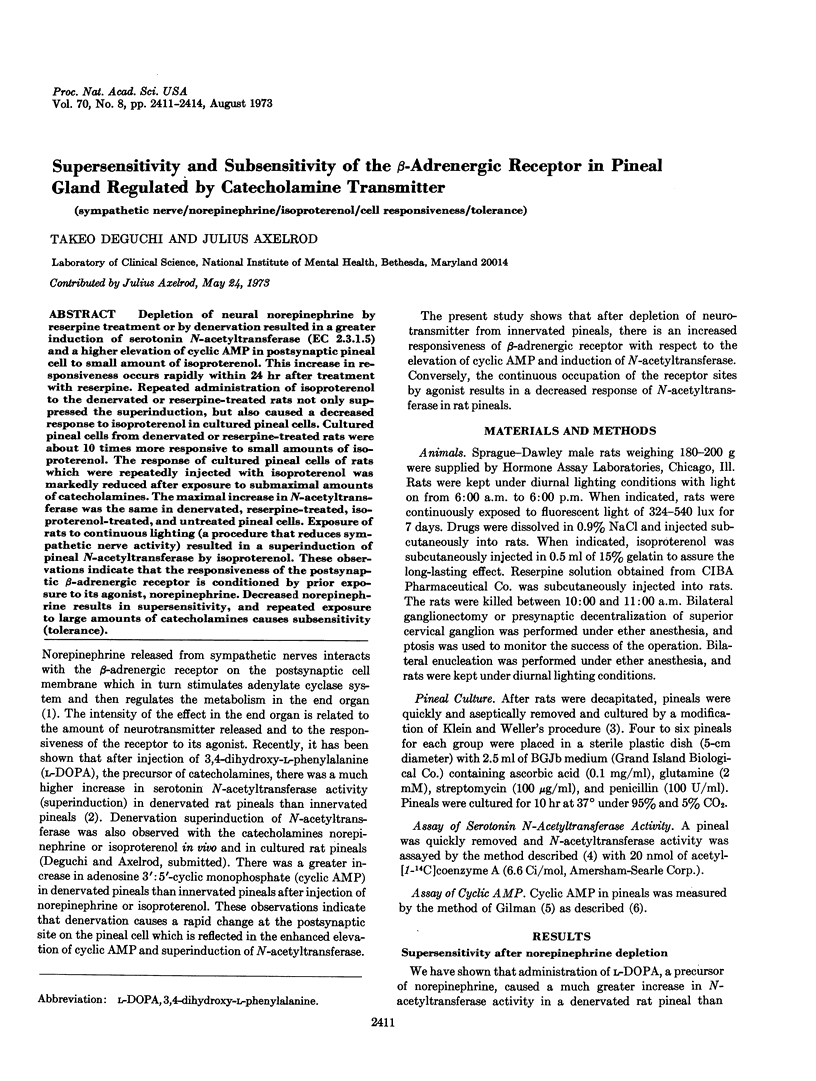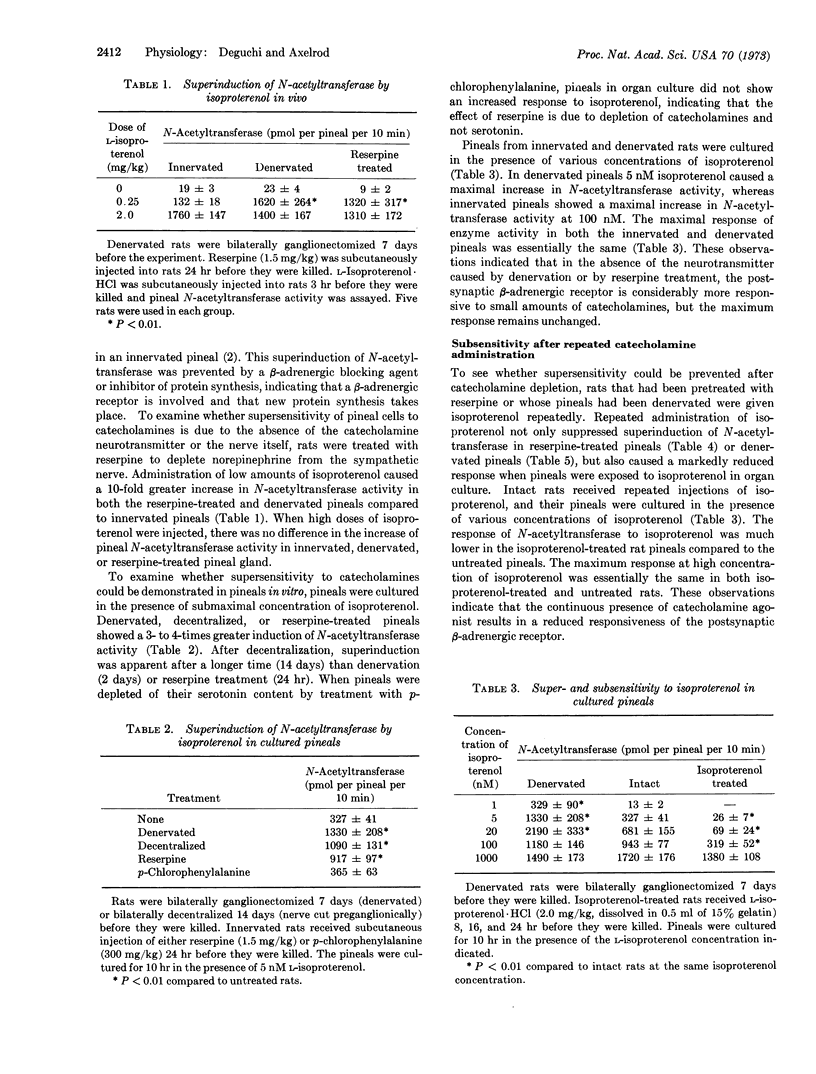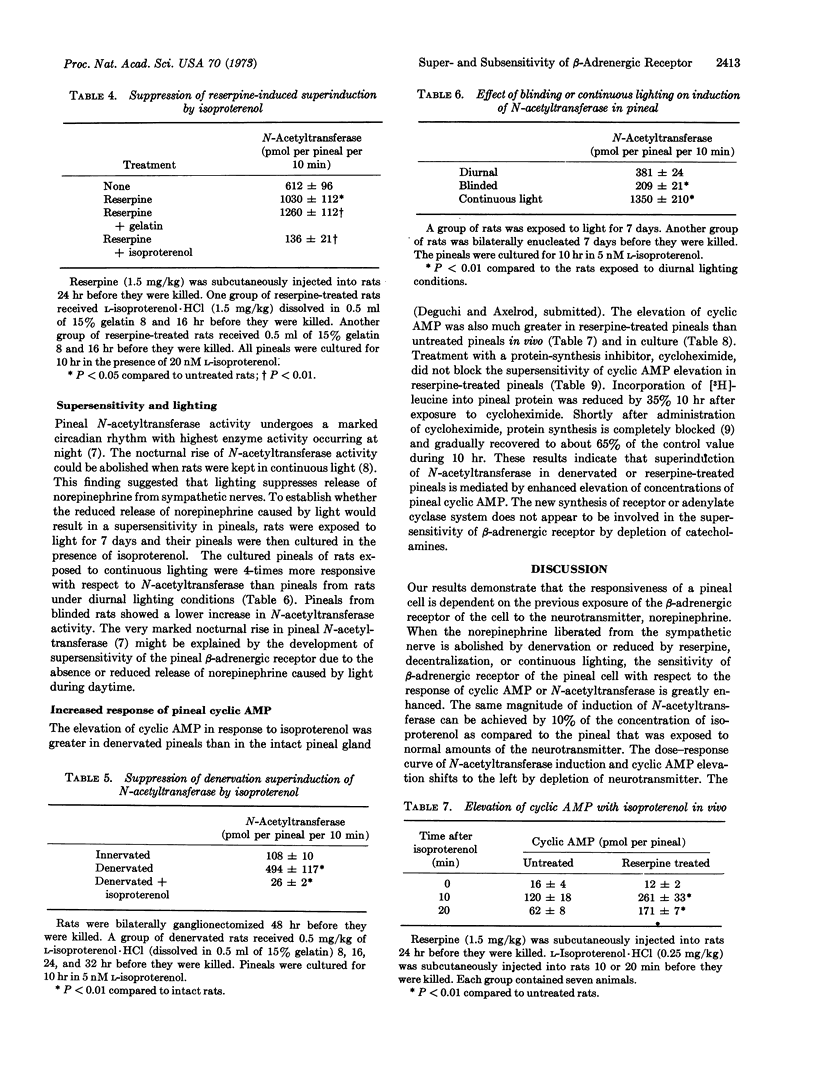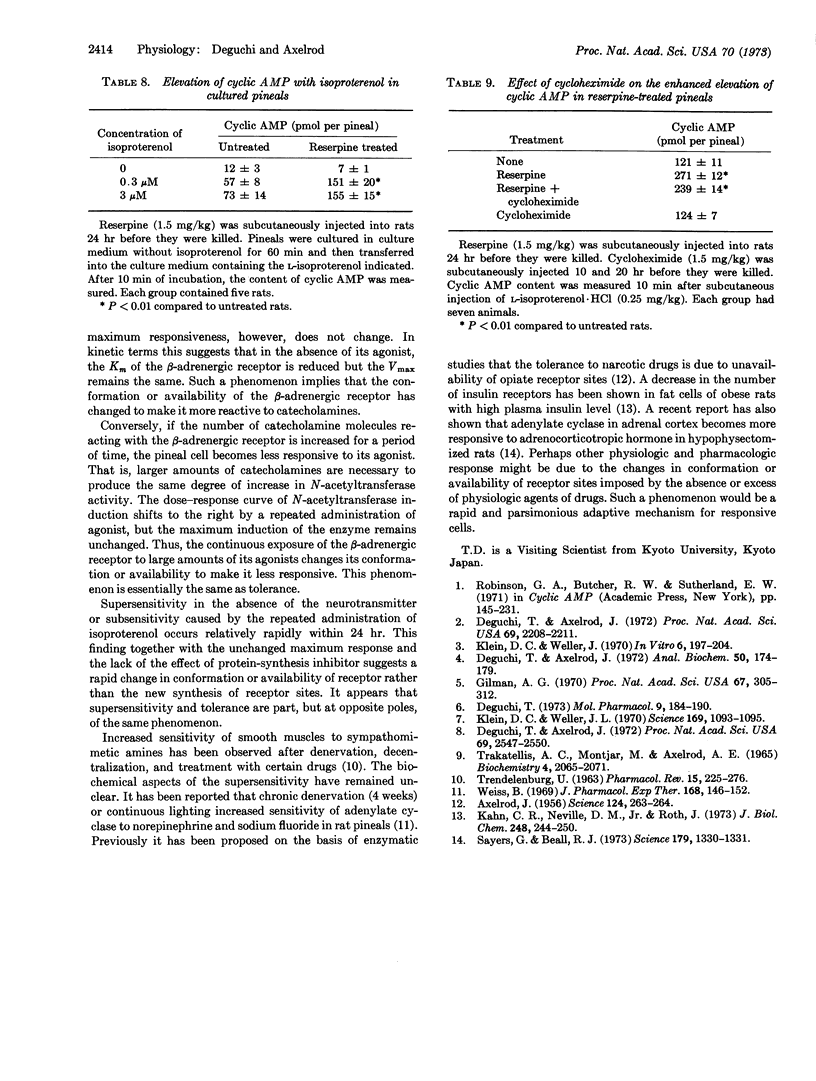Abstract
Depletion of neural norepinephrine by reserpine treatment or by denervation resulted in a greater induction of serotonin N-acetyltransferase (EC 2.3.1.5) and a higher elevation of cyclic AMP in postsynaptic pineal cell to small amount of isoproterenol. This increase in responsiveness occurs rapidly within 24 hr after treatment with reserpine. Repeated administration of isoproterenol to the denervated or reserpine-treated rats not only suppressed the superinduction, but also caused a decreased response to isoproterenol in cultured pineal cells. Cultured pineal cells from denervated or reserpine-treated rats were about 10 times more responsive to small amounts of isoproterenol. The response of cultured pineal cells of rats which were repeatedly injected with isoproterenol was markedly reduced after exposure to submaximal amounts of catecholamines. The maximal increase in N-acetyltransferase was the same in denervated, reserpine-treated, isoproterenol-treated, and untreated pineal cells. Exposure of rats to continuous lighting (a procedure that reduces sympathetic nerve activity) resulted in a superinduction of pineal N-acetyltransferase by isoproterenol. These observations indicate that the responsiveness of the postsynaptic β-adrenergic receptor is conditioned by prior exposure to its agonist, norepinephrine. Decreased norepinephrine results in supersensitivity, and repeated exposure to large amounts of catecholamines causes subsensitivity (tolerance).
Keywords: sympathetic nerve, norepinephrine, isoproterenol, cell responsiveness, tolerance
Full text
PDF



Selected References
These references are in PubMed. This may not be the complete list of references from this article.
- AXELROD J. Possible mechanism of tolerance to narcotic drugs. Science. 1956 Aug 10;124(3215):263–264. doi: 10.1126/science.124.3215.263. [DOI] [PubMed] [Google Scholar]
- Deguchi T., Axelrod J. Control of circadian change of serotonin N-acetyltransferase activity in the pineal organ by the beta--adrenergic receptor. Proc Natl Acad Sci U S A. 1972 Sep;69(9):2547–2550. doi: 10.1073/pnas.69.9.2547. [DOI] [PMC free article] [PubMed] [Google Scholar]
- Deguchi T., Axelrod J. Induction and superinduction of serotonin N-acetyltransferase by adrenergic drugs and denervation in rat pineal organ. Proc Natl Acad Sci U S A. 1972 Aug;69(8):2208–2211. doi: 10.1073/pnas.69.8.2208. [DOI] [PMC free article] [PubMed] [Google Scholar]
- Deguchi T., Axelrod J. Sensitive assay for serotonin N-acetyltransferase activity in rat pineal. Anal Biochem. 1972 Nov;50(1):174–179. doi: 10.1016/0003-2697(72)90496-4. [DOI] [PubMed] [Google Scholar]
- Deguchi T. Role of the beta adrenergic receptor in the elevation of adenosine cyclic 3',5'-monophosphate and induction of serotonin N-acetyltransferase in rat pineal glands. Mol Pharmacol. 1973 Mar;9(2):184–190. [PubMed] [Google Scholar]
- Gilman A. G. A protein binding assay for adenosine 3':5'-cyclic monophosphate. Proc Natl Acad Sci U S A. 1970 Sep;67(1):305–312. doi: 10.1073/pnas.67.1.305. [DOI] [PMC free article] [PubMed] [Google Scholar]
- Kahn C. R., Neville D. M., Jr, Roth J. Insulin-receptor interaction in the obese-hyperglycemic mouse. A model of insulin resistance. J Biol Chem. 1973 Jan 10;248(1):244–250. [PubMed] [Google Scholar]
- Klein D. C., Weller J. L. Indole metabolism in the pineal gland: a circadian rhythm in N-acetyltransferase. Science. 1970 Sep 11;169(3950):1093–1095. doi: 10.1126/science.169.3950.1093. [DOI] [PubMed] [Google Scholar]
- Klein D. C., Weller J. Input and output signals in a model neural system: the regulation of melatonin production in the pineal gland. In Vitro. 1970 Nov-Dec;6(3):197–204. doi: 10.1007/BF02617764. [DOI] [PubMed] [Google Scholar]
- Sayers G., Beall R. J. Isolated adrenal cortex cells: hypersensitivity to adrenocorticotropic hormone after hypophysectomy. Science. 1973 Mar 30;179(4080):1330–1331. doi: 10.1126/science.179.4080.1330. [DOI] [PubMed] [Google Scholar]
- TRENDELENBURG U. Supersensitivity and subsensitivity to sympathomimetic amines. Pharmacol Rev. 1963 Jun;15:225–276. [PubMed] [Google Scholar]
- Weiss B. Effects of environmental lighting and chronic denervation on the activation of adenyl cyclase of rat pineal gland by norepinephrine and sodium fluoride. J Pharmacol Exp Ther. 1969 Jul;168(1):146–152. [PubMed] [Google Scholar]


